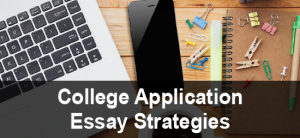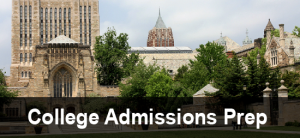Harvard offers an excellent free resource that can help you write a stunning, truly memorable Common Application essay.
This same resource can support you in crafting extraordinary personal narratives for the University of California’s “personal insight questions,” the Coalition Application prompts, and topics required by other non-Common App schools.
EXPENSIVE HARVARD SUMMER OPTION & DISPELLING A MYTH
One of my new students is a high school junior who believed participating in Harvard’s Summer School program would be the major distinguishing factor in his application package.
After all, it was Harvard, and he’d earn college credit for the classes.
In fact, Harvard publicizes how the Secondary School Program “will strengthen your application to any college or university” and provide you with “many opportunities designed to help you navigate the college-application process, gain admission to the college of your choice, and enhance your performance in a college setting.”
I’m not sure I agree with all of those claims, especially the first one.
However, some of my students have attended the Secondary School Program and enjoyed taking more advanced courses related to their interests. One of these students is now a junior at the University of Pennsylvania, where she’s a Vagelos Scholar in Molecular Life Sciences.
Did participating in the summer program at Harvard make any true difference with her applications?
I don’t think so.
Her substantial extracurricular experience related to her scientific interests–especially her independent hands-on research projects, experience working in a local professor’s lab, leadership of a Science Olympiad team, and long-term community service (which was connected to her passion for public health)–combined with her stellar grades, challenging classes at school, exceptional standardized test scores, and fascinating application essays definitely seemed more impressive than the fact that she took classes at Harvard.
Don’t get me wrong.
I’m not trying to put down Harvard’s Summer Program because it can be a really good option depending on your unique situation.
But it is definitely NOT necessary to participate in a summer program–even one at Harvard–that, on average, costs $11,900 (for tuition and room and board).
No one on an admissions committee is going to say, “Oh, wow. Look at this. John took summer classes at Harvard. Admit him.”
My student realized that taking yet another class wasn’t what he needed to pursue his fascination with a certain historical issue. Instead, I helped him design his own independent research project, connect with two professors whose work he admires and who agreed to review his work, integrate relevant community service into his work, and identify two journals where he might submit his essay.
In the end, this project is going to make the biggest difference for my student–as an individual and as an applicant.
However. . .
Harvard does have a resource he desperately needs, one that will help him distinguish himself from thousands of other students.
FREE HARVARD RESOURCE
FOR WRITING EXCELLENT
COMMON APP ESSAYS
So what’s this resource?
It’s the Lowell House Speeches Project.
Harvard students in this undergraduate House have the opportunity to give “five-minute speeches on topics of personal significance.”
These aren’t college application essays, but you should listen to at least five of them.
Here are some questions to consider. . . .
- What do you like about the way the narrative is structured? Is there something intriguing about where the student started or ended?
- What do you notice about the scope of the student’s talk? Does it cover a long period of time? If so, how does the student integrate a series of anecdotes that make you feel like you’ve really gotten to know him? Does the speaker have a super narrow scope? What advantage does a narrow scope give you?
- What do you enjoy about the anecdotes? How does the writer strike just the right balance between internal and external details. . .between showing and telling?
- Are there particular words, phrases, images, and sentences that you find beautiful, poignant, or memorable? What gives them these qualities?
- What do you think of the title? Is it necessary? Why? Why not?
- Some of the talks are accompanied by transcripts. How does the speaker vary the length of her paragraphs and use dialogue?
- What makes the talk memorable?
You don’t have to listen for all these things.
Dabble.
Zoom in on what attracts or repels you.
Consider how you might use similar devices or strategies in your own writing.
You don’t want to walk away just thinking: “Sophie’s talk was about x, y, and z, and it was great because. . . .”
You want to walk away thinking like this: “Wow, I never thought about how I could start my application essay with just one sentence, but Mark’s talk gave me a great idea for how to . . . .”
SOME OF MY FAVORITE
LOWELL HOUSE SPEECHES
There are almost 300 Lowell House Speeches you can listen to/watch.
I want to share with you some of my favorites.
Dillon Cruz’s “Goose Creek” (2016) is a riveting, memorable, and elegant inter-generational narrative about “thirty years of promises and choices and sacrifices.” On the surface, it seems like the narrative is mainly about his father, grandfather, and mother, but as you’ll notice at the end, it’s ultimately about Dillon. He points out that these “stories are more than just stories” to him; they are “central to who” he is becoming. His showing is the most powerful telling.
Meghan Cleary’s “Dad’s Girlfriend” (2011) “brought the crowded Lowell House dining hall. . .to stunned silence and then catharsis.” Hmmm….Wouldn’t you love to have this kind of effect on the admissions officers reading your application? Are there any underlying strategies that you could borrow?
The twists and turns in Delfina Martinez-Pandiani’s “Exposed” (2017) are hauntingly poignant and memorable. I love how the whole talk emerges out of a haircut, people’s reactions to it, and how the act and reactions have shifted her perspectives on herself.
These three talks could work for the first Common App essay topic (“Some students have a background, identity, interest, or talent that is so meaningful they believe their application would be incomplete without it”), the fifth topic (“an accomplishment, event or realization that sparked a period of personal growth and a new understanding of yourself or others”), or the seventh topic (“Share an essay on any topic of your choice”). CLICK HERE to learn more about the Common App essay topics.
YOUR NEXT STEPS
If you want to transform your college preparation and application process into an “intense, whimsical, surprising, and transformative” experience that also helps you stand out from the thousands of other applicants, book a private consultation or learn about how you can get more comprehensive support from me.



